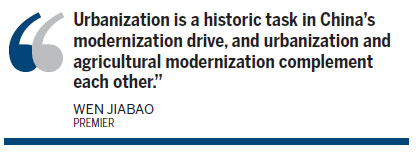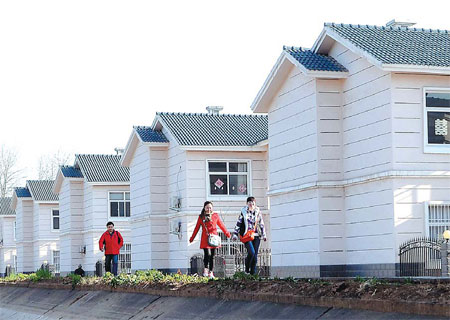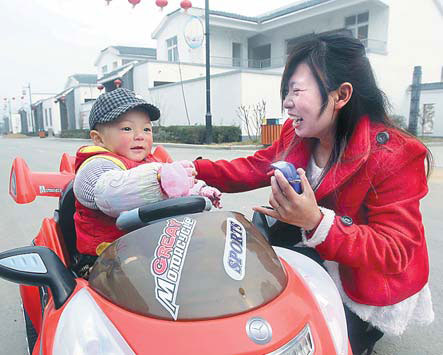Premier calls for hukou reform to be speeded up
Updated: 2013-03-06 07:06
By Lu Chang (China Daily)
|
||||||||
|
Villagers pass newly built houses at Yuantun village in Jiaozuo city, Henan province. The province's urban population accounted for 42.2 percent of its total population at the end of 2012, a year-on-year rise of 1.8 percentage points. Photos by Wang Song / Xinhua |
|
A woman and her son have fun at a newly constructed community in Zhangzhuang village, Pingdingshan, Henan province, in March 2012. |

Wen appeals for an 'active but prudent' advance for urban growth
Premier Wen Jiabao called for efforts in his Government Work Report on Tuesday to advance urbanization "actively yet prudently" by speeding up reform of the household registration system.
"Urbanization is a historic task in China's modernization drive, and urbanization and agricultural modernization complement each other," Wen said during the opening of the first session of the 12th National People's Congress on Tuesday.
To advance urbanization, the government should register eligible rural workers as permanent urban residents in an orderly manner, and expand the coverage of basic public services in urban areas to migrant workers and other permanent residents, he said.
In his final Government Work Report as premier, Wen said he made his suggestions "based on an understanding of the work of the past 10 years, especially of the past five years" as part of the country's efforts to promote integrated urban and rural development.
Wen also advised the new government to keep megacities and large cities at an appropriate scale to drive development of surrounding areas and strengthen the ability of small- and medium-sized cities to develop industries, provide public services and increase employment.
In 2012, China's urban population accounted for 52.57 percent of the population, up 1.3 percentage points from a year earlier, and the rate is expected to rise to 53.37 percent in 2013, according to the National Bureau of Statistics.
Experts said China's urbanization is becoming an engine to fuel domestic demand and economic growth, as increasing numbers of urbanites offer huge potential for consumption.
But urbanization also forces a large number of farmers to become migrant workers, with most of them without hukou, or household registration, therefore often excluded from social services and opportunities.
Chen Xiwen, deputy director of the Leading Group on Rural Work of the Communist Party of China Central Committee, said urbanization should be a natural process rather than a new, fast-tracked step forward.
He said the process, which draws rural labor to cities and assimilates new recruits, needs all factors to be considered, including economic development, social welfare and environmental problems.
"There are benefits from urbanization's potential to boost domestic consumption and increase labor productivity, but it will also lead to serious consequences if the pace and nature of urbanization are disregarded," he said while attending the first group discussion at the annual session of the Chinese People's Political Consultative Conference National Committee on Monday.
He said migrant workers should be covered by the urban public service network in the fields of housing, employment and education, which needs the support of local government.
A 2013 report by Renmin University of China on migrant workers shows they feel lonely despite increased incomes, as they are an isolated group and seldom interact with urban society during their stay in cities.
Wu Hong, a member of the CPPCC National Committee, said: "Migrant workers should be treated as equals to city dwellers so they will not come back and forth from cities to their hometowns."
Wu, also the deputy director of the Zhejiang province forestry department, said the Government Work Report this year mapped out the path for advancing urbanization so that migrant workers can expect to be able to settle down in cities and hopefully contribute more to local consumption.
lvchang@chinadaily.com.cn
(China Daily 03/06/2013 page8)

 In Photos: 7.0-magnitude quake hits Sichuan
In Photos: 7.0-magnitude quake hits Sichuan
 Li Na on Time cover, makes influential 100 list
Li Na on Time cover, makes influential 100 list
 FBI releases photos of 2 Boston bombings suspects
FBI releases photos of 2 Boston bombings suspects
 World's wackiest hairstyles
World's wackiest hairstyles
 Sandstorms strike Northwest China
Sandstorms strike Northwest China
 Never-seen photos of Madonna on display
Never-seen photos of Madonna on display
 H7N9 outbreak linked to waterfowl migration
H7N9 outbreak linked to waterfowl migration
 Dozens feared dead in Texas plant blast
Dozens feared dead in Texas plant blast
Most Viewed
Editor's Picks

|

|

|

|

|

|
Today's Top News
Live report: 7.0-magnitude quake hits Sichuan, heavy casualties feared
Boston suspect cornered on boat
Cross-talk artist helps to spread the word
'Green' awareness levels drop in Beijing
Palace Museum spruces up
First couple on Time's list of most influential
H7N9 flu transmission studied
Trading channels 'need to broaden'
US Weekly

|

|









